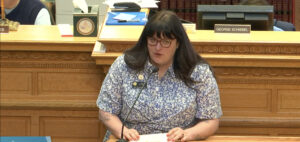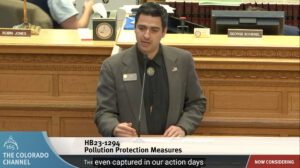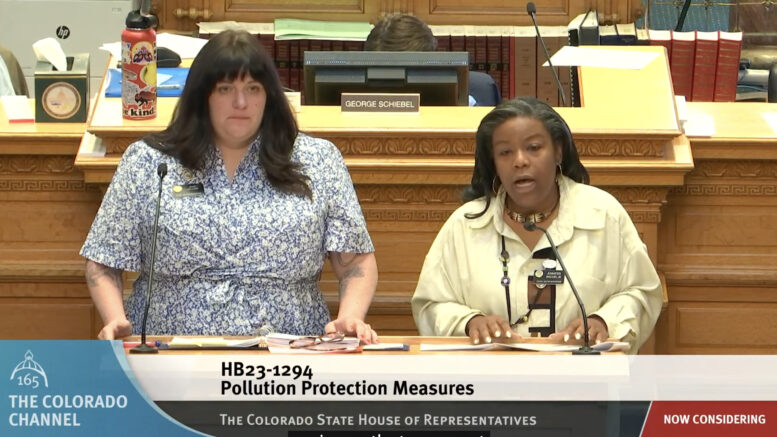A bill aimed at cutting air pollution, pared down once already to make it through a key committee, went through a second round of significant cutbacks in recent days to reduce its costs but still faces strenuous opposition from the business and oil-and-gas communities.
House Bill 1294, first proposed by sponsoring Democratic Reps. Jennifer Bacon of Denver and Jenny Willford of Northglenn to boost permitting regulation for any business emitting pollutants, had most of its restrictions bumped back to a study on April 20. It continued to require more investigation of citizen complaints by the Colorado Department of Public Health and Environment and set in motion rulemakings for several new regulations, however, leading business groups and several members of Gov. Jared Polis’ administration to call it infeasible.
On Friday morning in the House Appropriations Committee, the sponsors cut it further, adding amendments that Willford said were “intended to further limit the scope of this bill in response to feedback from stakeholders, industry and the administration.” The major changes:
- Struck the proposed timelines under which CDPHE must investigate citizen complaints — 30 days to begin an investigation and 90 more days to come to a decision;
- Deleted a requirement for the state to create emissions standards for stationary engines at drilling sites;
- Nixed a mandate that until the northern Front Range, given “severe” ozone nonattainment status by the U.S. Environmental Protection Agency, is a maintenance area that the state must add the “most stringent” standards available for off-road compression-ignition engines and use of electric drill rigs and electric hydraulic fracturing engines to its implementation plan;
- Eliminated a provision that would have wrapped minor sources of emissions into the regulations of the air-pollutant control and reduction program;
- Eliminated a requirement triggering new permits for any modifications of facilities that increase emissions; and,
- Removed the requirement that civil penalties for pollution citations consider the impact on public health, safety, welfare, the environment and wildlife and biological effects.
“The intent has never been to shut down industries or to stop issuing air-quality permits. But, my friends, the law of holes says that when you find yourself in a hole, stop digging,” Willford told the House of aims to make it harder for even minor polluters to get construction permits. “Colorado has an ozone problem, members, and it’s past time that we take the needed steps to solve it.”

Colorado state Rep. Jenny Willford speaks about why House Bill 1294 is needed during House debate on the bill Saturday.
Continuing objections
However, even after those changes, the bill still contains several provisions that business and energy leaders say are unworkable and could have a crippling on everything from drilling pads to new factories. Those include:
- The creation of an interim committee made up entirely of legislators to study additional ozone-reduction measures and permitting reform and propose as many as five bills to be introduced in the 2024 legislative session;
- The allowance of a person claiming injury from pollution to file a lawsuit and to ask the that judge substitute the Colorado Air Quality Control Commission as the complaining party to move the lawsuit forward;
- Allowance of complainants to submit evidence that a violation of state ordinances has occurred rather than requiring CDPHE to have to see and record for itself actions could lead to violations of laws around noise, smell or other measures of pollution;
- A requirement that any penalty assessed on a pollution violator must be no less than the economic benefit that the violator gained from the infraction; and,
- A definition of “cumulative impacts” of the effects of oil and gas operations on the environment and future development of an area that state officials must use in consideration of future permit approvals or denials.
“The clear lack of knowledge about the processes and rulemakings already occurring at the state and federal levels to address many of the issues brought forth in this bill is astonishing and incredibly disappointing,” said Kait Schwartz, director of American Petroleum Institute Colorado in a statement to The Sum & Substance. “This bill should not move forward, not only because of the many technical issues identified, but because no work has been done to properly stakeholder the bill with impacted industries in order to understand implications and unintended consequences. Our collective work in improving Colorado’s air quality matters too much to be cast aside by political impulse.”
Debate highlights
House members debated the reshaped bill on Saturday for an hour — a time limit set by House leaders over the objection of Republicans and seven Democrats — and rejected 12 Republican amendments to HB 1294. Among other things, they would have required a higher standard for residents to file complaints with CDPHE, removed the new definition of cumulative impacts, removed the requirement that penalties exceed economic benefits and sought to put an even number of Republicans and Democrats on the now Democrat-weighted interim committee.

Colorado state Rep. Gabe Evans speaks against HB 1294 in the House on Saturday.
Willford and Rep. Gabe Evans, R-Fort Lupton, got into a spat on the floor over the number of amendments brought forward. Willford said she might have discussed them more if she’d seen any of them before the debate Saturday, while Evans retorted that they were written by a coalition of organizations that felt they were left out of the stake-holding process so far.
Sponsors only accepted one amendment, from Republican Rep. Ty Winter of Trinidad, though it wasn’t enough to remove any opposition. The provision requires the interim committee to seek presentations and comments from affected industries, workers, local governments and relevant state agencies in addition to impacted communities experiencing ozone pollution.
Debate over cause of air pollution
While groups like API and the Colorado Chamber of Commerce remain opposed to HB 1294, even in its twice-changed form, legislators are likely to see if the changes move anyone else. Among opponents to earlier versions of the bill are traditional Democratic allies such as the United Steelworkers (for fear of it costing jobs) and two state agencies — CDPHE and the Colorado Oil and Gas Conservation Commission.
In addition to what they feel is the overreach of the bill and the improper insertion of the Legislature into an ongoing process of ozone rules development between CDPHE, COGCC and the Regional Air Quality Council, opponents say the targets of the bill are misguided. Evans, for example, noted studies showing that methane emissions decreased 52% on the Front Range from 2013 to 2019 and that ethane emissions fell 65% in Weld County during that time, and he argued that Colorado’s ozone problem is fed in no small part by emissions from other states.
Willford, however, cited the 73 ozone-alert days the northern Front Range experienced in 2021 and the 46 it recorded in 2022 and said that Colorado’s air-permitting process allows for new air-pollution sources to be built without assessing their impact. The state needs more tools to improve its air quality, and the bill seeks to provide those and protect communities, she said.
The House is expected to give final approval to HB 1294 today and send it to the Senate, where its fate remains unknown. The Legislature must adjourn its 2023 session by May 8.
